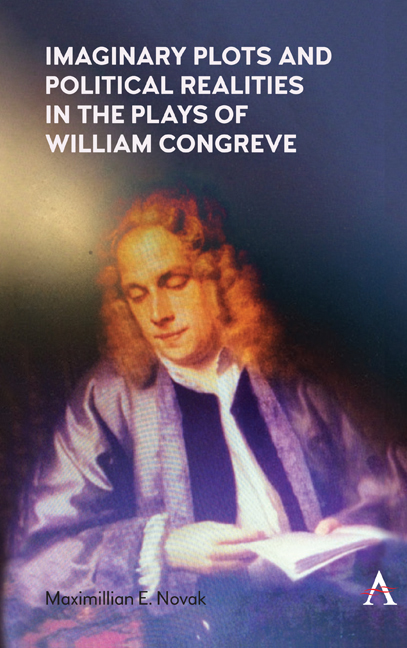Book contents
- Frontmatter
- Contents
- List of Illustrations
- Acknowledgments
- Preface
- 1 The Politics of Love, Marriage, and Scandal in Congreve's World
- 2 Incognita and Some Problems in Morality and Epistemology
- 3 The “Fashionable Cutt of the Town” and William Congreve's The Old Batchelor
- 4 Political and Moral Double Dealing in Congreve's The Double Dealer
- 5 Foresight in the Stars and Scandal in London: Reading the Hieroglyphics in Congreve's Love for Love
- 6 The Failure of Perception and Politics in Congreve's The Mourning Bride
- 7 Politics and Congreve's The Way of the World
- Afterword
- Works Cited
- Index
5 - Foresight in the Stars and Scandal in London: Reading the Hieroglyphics in Congreve's Love for Love
Published online by Cambridge University Press: 21 July 2020
- Frontmatter
- Contents
- List of Illustrations
- Acknowledgments
- Preface
- 1 The Politics of Love, Marriage, and Scandal in Congreve's World
- 2 Incognita and Some Problems in Morality and Epistemology
- 3 The “Fashionable Cutt of the Town” and William Congreve's The Old Batchelor
- 4 Political and Moral Double Dealing in Congreve's The Double Dealer
- 5 Foresight in the Stars and Scandal in London: Reading the Hieroglyphics in Congreve's Love for Love
- 6 The Failure of Perception and Politics in Congreve's The Mourning Bride
- 7 Politics and Congreve's The Way of the World
- Afterword
- Works Cited
- Index
Summary
The character of Sir Sampson Legend, along with that of Foresight, is one of the great achievements of Congreve's Love for Love. Both parties represent systems of thinking that are presented as antiquated and absurd. Before the entrance of Sir Sampson, Foresight has just been speculating on the possibility that his wife may be having love affairs. He begins by remarking that she is “young and sanguine,” perfectly adequate descriptions at a time when the humors theory still governed attitudes toward character, but he quickly enters into theories of astrology, physiognomy, and palmistry, pointing out that she was born under the sign of Gemini and had a mole on her lip. Compared to these, her “open liberality on the Mount of Venus” (Volume 1: 285 [II. iii, 104– 5]) would seem a direct description of her sexual promiscuity, not so much to Foresight and his naive appeal to palmistry, where it refers to the area at the base of the thumb, but clearly enough to Sir Sampson and the audience as part of the vaginal area. Foresight's absurd mixture of out- of- date pseudosciences and primitive folk readings of character and events will play an important role in this comedy of readings and misreadings.
Sir Sampson's skeptical view of such matters and his tendency toward exaggeration are both seemingly based on his extensive travels, but he too is tied to antiquated systems. He complains that his son, Valentine, did not realize the powers that belonged to a father, “no Authority, no Correction, no Arbitrary Power” (1:286 [II.v, 5– 6]). His dismissal of “Forgiveness and Affection” and his embrace of “Power” might seem to identify him as a wrong- headed disciple of Thomas Hobbes, who viewed the entire relationship between father and son as based on obedience to the parent. But Hobbes wrote mainly of “power,” “dominion,” and “sovereignty,” the distinguishing factors between children, servants, and slaves. Sir Sampson's “Arbitrary Power” smacks of the criticism leveled against Louis XIV by contemporaries and of John Locke's attack upon Sir Robert Filmer's patriarchal ideas of government. Indeed, in addressing his son, Valentine, Sir Sampson maintains that his son is his “Slave” (1:291 [II.vii, 40]), a category based upon the freedom of Sir Sampson's choosing to engage in the act of sexual intercourse that produced him.
- Type
- Chapter
- Information
- Publisher: Anthem PressPrint publication year: 2020



